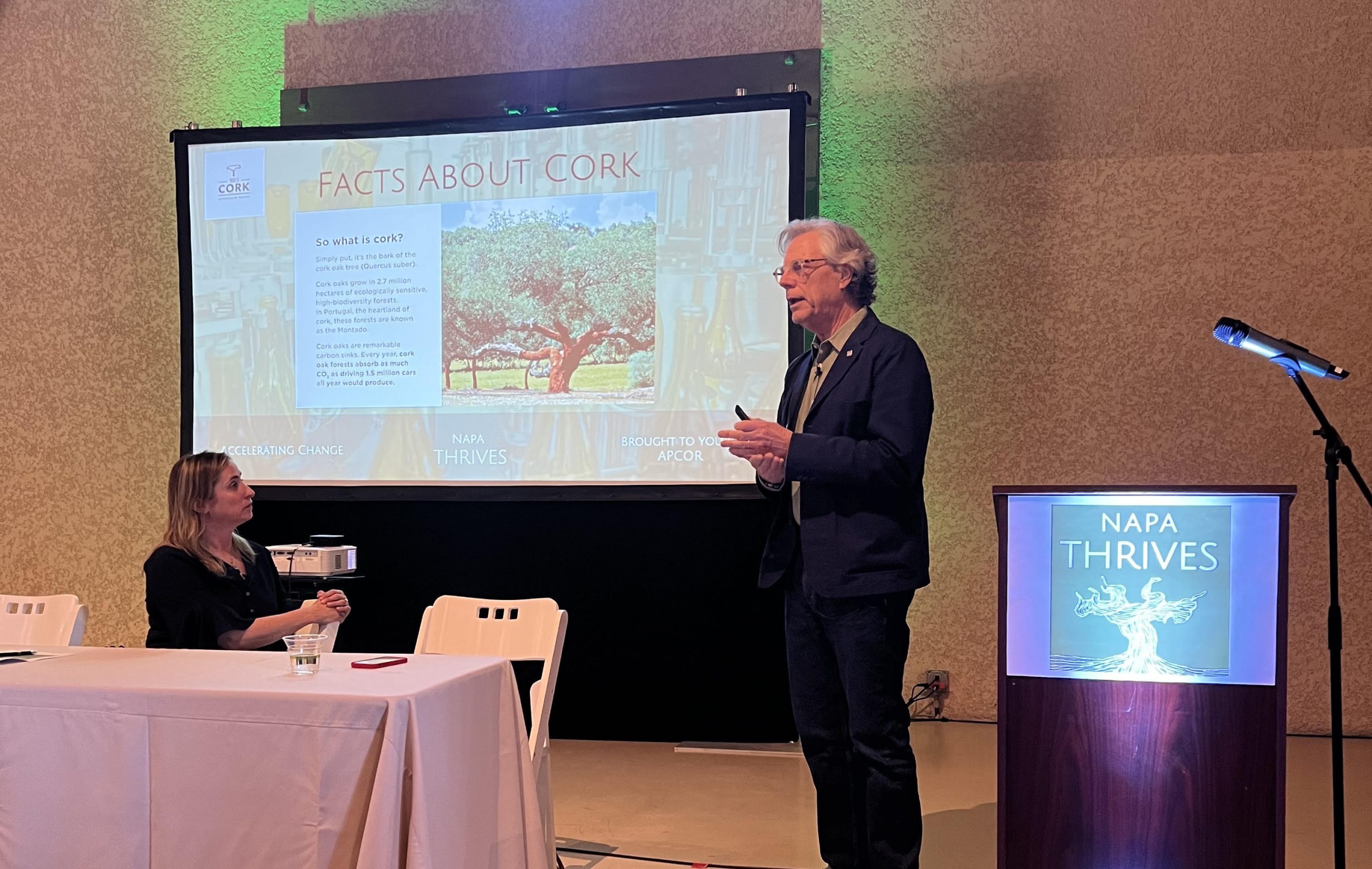100% Cork Campaign Supports Inaugural Napa Thrives Symposium on Sustainability
APCOR Joins First of its Kind Cross-Organizational Series in the Napa Valley to Promote Climate Action and Sustainable Winegrowing
NEW YORK, August 1, 2022 – 100% Cork and The Portuguese Cork Association (APCOR) joined Napa Green, the leading sustainable winegrowing program, and other community partners for its first Napa THRIVES symposium to educate and inspire Napa’s wine industry to establish standards for sustainability and climate action. Held June 7 to the 23, the cross-organizational series attracted some of the leading voices in the wine industry from winemakers and environmental scientists to wine critics. The series of events focused on the six pillars of sustainable winegrowing leadership, covering a range of topics such as water and energy conservation, regenerative farming, sustainability in packaging, and waste management.
Recognizing that the climate crisis is already having an impact on the wine industry, Napa Green, along with other environmental groups and winery partners, launched Napa THRIVES to not only educate but to also accelerate action on climate change. It chose Napa Valley because of the region’s prominence and ability to galvanize the industry at large. Each event featured on and off-site practical workshops and seminars on sustainable practices moderated by the wine trade and environmental scientists.
As the only sustainable wine closure recommended for Napa Green certified wineries, cork is a perfect balance between environmental preservation and sustainable development. As a foraged and not cultivated material, cork bark is a 100% renewable natural resource.
The cork oak forest is one of the world’s 36 biodiversity hotspots and can retain 14,000,000 tons of CO2 per year. It is estimated that for every ton of cork produced, cork oak forests capture 73 tons of CO2. The harvesting of cork does not damage but improves the health of the cork tree. After the harvest, the bark regenerates for the next 9 years until the next harvest, while continuously removing CO2 from the atmosphere. A single tree can be harvested up to 20 times and capture 20 tons of CO2 over its 200-plus year lifetime.
“When I think about cork I think about wine, of course, and I also think about quality and stewardship,” notes Anna Brittain, Executive Director of Napa Green. “I couldn’t imagine not highlighting cork as a key material to helping fight climate change when conceptualizing Napa THRIVES. Its many environmental benefits – carbon sequestration, flora and fauna biodiversity, anti-desertification properties (both human and environmental), and rural community support – are reflective of the broader definition of sustainability that we are trying to communicate and build infrastructure for in our Napa Green certifications.”
The 100% Cork campaign was the featured sponsor of the Napa THRIVES day focused on waste prevention and green purchasing in the industry. Held on June 14, the event focused on the different ways that the industry can reduce their environmental footprint and eliminate waste throughout the production chain by using renewable and recyclable materials such as natural cork. The seminars included a presentation on the carbon footprint of packaging and distribution, exploring the environmental and social benefits of cork, and the life cycles of different closures. The seminar was introduced via video by renowned wine critic, Jancis Robinson, MW who discussed heavy glass bottles and the carbon footprint associated with non-sustainable packaging, as well as the impact travel and transport in our industry can have on the environment. This was followed by the “The Carbon Footprint of Packaging & Distribution” seminar, which was led by a panel of experts including Remi Cohen of Domaine Carneros, Patrick Spencer with The Cork Forest Alliance, and Carolina Leonhardt at Clif Bar & Company.
“Cork production is the most sustainable and environmentally friendly forestry practice on the planet, and cork harvesters are the highest paid agricultural workers in Europe. Cork is also the most sustainable wine closure on the market,” says Spencer. “By using a natural cork to seal a wine bottle, you can help offset the CO2 that was created during the production of that bottle.”
According to a Cork Quality Council (CQC) review of audited life cycle assessment studies of cork, an average wine cork has a negative carbon footprint of -5 grams. But the net amount is actually -276 grams per cork when the average biogenic carbon cycle of cork oak forests is included.
For Spencer, “Napa THRIVES was a well-developed program of sessions designed to help engage and educate winemakers on the issues facing global climate change. This series of panel sessions were instrumental in helping to define ‘real’ sustainability practices for wineries, and the takeaways couldn’t be more clear…there is no time to waste in developing net zero practices for one of the world’s preeminent wine regions.”
About 100% Cork
100% Cork is an educational communications campaign about wine cork stoppers. The mission of the campaign is to provide the wine industry and consumers with the latest information and research on the benefits of natural cork. The campaign was established by the Portuguese Cork Association (APCOR) with support from the Cork Quality Council to increase awareness of the unique qualities and sustainability of natural cork.
About APCOR
Associação Portuguesa da Cortiça (APCOR) exists to represent and promote the Portuguese cork industry and its products. APCOR is the employers’ association of national scope, created in 1956 and is based in Santa Maria de Lamas, at the heart of the cork industry around 30 kilometers from Porto, Portugal’s second largest city. Membership of the association is open to all companies operating in the fields of production, marketing or export of cork products. The organization advocates on behalf of the Portuguese cork industry worldwide and is the driving force of an industry based on tradition, innovation and sustainability.
Making the commitment to third party certification takes time and effort, but it is worth it to demonstrate our commitment to the community and to protect our watershed, our land and the air we breathe.
- Susan Boswell, Chateau Boswell Winery

